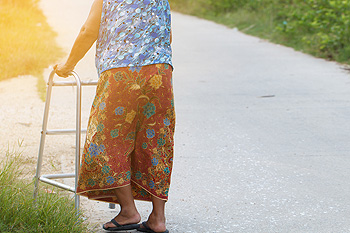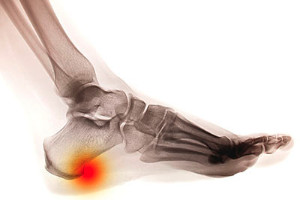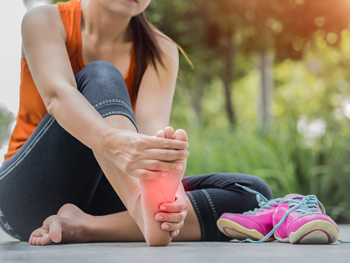Freehold (732) 294-9393
Freehold (732) 294-9393
 When older people fall, they may become fearful to then complete daily activities, and can lose some of their independence. Additionally, the fear of falling may have some seniors become anxious and depressed. A helpful method that may prevent these feelings from developing may come from implementing fall prevention strategies, which may enable older people to feel more secure. These can consist of removing torn rugs from the living environment, and installing grab bars in the shower and toilet area. Additionally, it is beneficial to have regular vision and physical examinations to update current prescriptions and eyeglasses. If you would like more information about fall prevention techniques, please consult with a podiatrist who can help you avoid potential painful foot conditions.
When older people fall, they may become fearful to then complete daily activities, and can lose some of their independence. Additionally, the fear of falling may have some seniors become anxious and depressed. A helpful method that may prevent these feelings from developing may come from implementing fall prevention strategies, which may enable older people to feel more secure. These can consist of removing torn rugs from the living environment, and installing grab bars in the shower and toilet area. Additionally, it is beneficial to have regular vision and physical examinations to update current prescriptions and eyeglasses. If you would like more information about fall prevention techniques, please consult with a podiatrist who can help you avoid potential painful foot conditions.
Preventing falls among the elderly is very important. If you are older and have fallen or fear that you are prone to falling, consult with Dr. Henry Miller from New Jersey. Our doctor will assess your condition and provide you with quality advice and care.
Every 11 seconds, an elderly American is being treated in an emergency room for a fall related injury. Falls are the leading cause of head and hip injuries for those 65 and older. Due to decreases in strength, balance, senses, and lack of awareness, elderly persons are very susceptible to falling. Thankfully, there are a number of things older persons can do to prevent falls.
How to Prevent Falls
Some effective methods that older persons can do to prevent falls include:
Falling can be a traumatic and embarrassing experience for elderly persons; this can make them less willing to leave the house, and less willing to talk to someone about their fears of falling. Doing such things, however, will increase the likelihood of tripping or losing one’s balance. Knowing the causes of falling and how to prevent them is the best way to mitigate the risk of serious injury.
If you have any questions, please feel free to contact our office located in Freehold, NJ . We offer the newest diagnostic and treatment technologies for all your foot care needs.
 Pain in the heel area is a common type of foot pain. Many people have a condition that is referred to as heel spurs, and the patient may become aware of this condition when frequent heel pain is present. It is defined as a small bone that grows and extends from the heel bone. This ailment may be caused for a variety of reasons. These can include medical conditions such as flat feet or high arches, a tight Achilles tendon, or from wearing shoes that do not fit correctly. Patients may notice the pain is worse upon arising in the morning, and may become uncomfortable if running activities are pursued. There are several types of treatment options available, and it is suggested that you schedule a consultation with a podiatrist who can determine which one is best for you.
Pain in the heel area is a common type of foot pain. Many people have a condition that is referred to as heel spurs, and the patient may become aware of this condition when frequent heel pain is present. It is defined as a small bone that grows and extends from the heel bone. This ailment may be caused for a variety of reasons. These can include medical conditions such as flat feet or high arches, a tight Achilles tendon, or from wearing shoes that do not fit correctly. Patients may notice the pain is worse upon arising in the morning, and may become uncomfortable if running activities are pursued. There are several types of treatment options available, and it is suggested that you schedule a consultation with a podiatrist who can determine which one is best for you.
Heel spurs can be incredibly painful and sometimes may make you unable to participate in physical activities. To get medical care for your heel spurs, contact Dr. Henry Miller from New Jersey. Our doctor will do everything possible to treat your condition.
Heels Spurs
Heel spurs are formed by calcium deposits on the back of the foot where the heel is. This can also be caused by small fragments of bone breaking off one section of the foot, attaching onto the back of the foot. Heel spurs can also be bone growth on the back of the foot and may grow in the direction of the arch of the foot.
Older individuals usually suffer from heel spurs and pain sometimes intensifies with age. One of the main condition's spurs are related to is plantar fasciitis.
Pain
The pain associated with spurs is often because of weight placed on the feet. When someone is walking, their entire weight is concentrated on the feet. Bone spurs then have the tendency to affect other bones and tissues around the foot. As the pain continues, the feet will become tender and sensitive over time.
Treatments
There are many ways to treat heel spurs. If one is suffering from heel spurs in conjunction with pain, there are several methods for healing. Medication, surgery, and herbal care are some options.
If you have any questions feel free to contact our office located in Freehold, NJ . We offer the latest in diagnostic and treatment technology to meet your needs.
 Patients who have endured an Achilles tendon injury are often aware of the debilitating pain and discomfort this condition may cause. It can occur as a result of frequently participating in running and jumping activities, and can be a common injury among tennis players. The consistent jumping and turning may cause the Achilles tendon to become weak, which is located on the lower part of the calf. The function of this tendon is to connect the heel to the calf muscles, and can be quite painful if it becomes torn and inflamed. Patients who have endured an Achilles tendon injury may find mild relief when the affected foot is elevated, and it may help to perform specific stretching techniques. If you feel pain in the calf and heel area, it is strongly suggested that you consult with a podiatrist as quickly as possible so the correct treatment can begin.
Patients who have endured an Achilles tendon injury are often aware of the debilitating pain and discomfort this condition may cause. It can occur as a result of frequently participating in running and jumping activities, and can be a common injury among tennis players. The consistent jumping and turning may cause the Achilles tendon to become weak, which is located on the lower part of the calf. The function of this tendon is to connect the heel to the calf muscles, and can be quite painful if it becomes torn and inflamed. Patients who have endured an Achilles tendon injury may find mild relief when the affected foot is elevated, and it may help to perform specific stretching techniques. If you feel pain in the calf and heel area, it is strongly suggested that you consult with a podiatrist as quickly as possible so the correct treatment can begin.
Achilles tendon injuries need immediate attention to avoid future complications. If you have any concerns, contact Dr. Henry Miller of New Jersey. Our doctor can provide the care you need to keep you pain-free and on your feet.
What Is the Achilles Tendon?
The Achilles tendon is a tendon that connects the lower leg muscles and calf to the heel of the foot. It is the strongest tendon in the human body and is essential for making movement possible. Because this tendon is such an integral part of the body, any injuries to it can create immense difficulties and should immediately be presented to a doctor.
What Are the Symptoms of an Achilles Tendon Injury?
There are various types of injuries that can affect the Achilles tendon. The two most common injuries are Achilles tendinitis and ruptures of the tendon.
Achilles Tendinitis Symptoms
Rupture Symptoms
Treatment and Prevention
Achilles tendon injuries are diagnosed by a thorough physical evaluation, which can include an MRI. Treatment involves rest, physical therapy, and in some cases, surgery. However, various preventative measures can be taken to avoid these injuries, such as:
If you have any questions please feel free to contact our office located in Freehold, NJ . We offer the newest diagnostic tools and technology to treat your foot and ankle needs.
 Research has indicated that there are many benefits of running. People who enjoy this sport are often aware of the positive aspects cardiovascular exercise can provide. These may include producing endorphins, keeping the heart and body healthy, and shedding excess weight. Many runners know the importance of warming up before and after a run, as this may be helpful in preventing running injuries. Achilles tendonitis is a common running injury. This tendon connects the calf muscles to the heel, and can become quite painful if it becomes torn or injured. This type of injury can possibly be prevented by performing heel raises, and this may be beneficial in strengthening the calves. Additionally, patients may experience plantar fasciitis. This is an inflammation of the plantar fascia, which is the portion of tissue that connects the heel to the toes. A common prevention technique can include wearing shoes that fit correctly, and practicing specific foot stretches. If you would like additional information about how running injuries can affect the feet, please consult with a podiatrist.
Research has indicated that there are many benefits of running. People who enjoy this sport are often aware of the positive aspects cardiovascular exercise can provide. These may include producing endorphins, keeping the heart and body healthy, and shedding excess weight. Many runners know the importance of warming up before and after a run, as this may be helpful in preventing running injuries. Achilles tendonitis is a common running injury. This tendon connects the calf muscles to the heel, and can become quite painful if it becomes torn or injured. This type of injury can possibly be prevented by performing heel raises, and this may be beneficial in strengthening the calves. Additionally, patients may experience plantar fasciitis. This is an inflammation of the plantar fascia, which is the portion of tissue that connects the heel to the toes. A common prevention technique can include wearing shoes that fit correctly, and practicing specific foot stretches. If you would like additional information about how running injuries can affect the feet, please consult with a podiatrist.
Exercising your feet regularly with the proper foot wear is a great way to prevent injuries. If you have any concerns about your feet, contact Dr. Henry Miller of New Jersey. Our doctor will treat your foot and ankle needs.
How to Prevent Running Injuries
Many common running injuries are caused by overuse and overtraining. When the back of the kneecap starts wearing out and starts causing pain in your knee, this is commonly referred to as runner’s knee. Runner’s knee is a decrease in strength in your quadriceps and can occur if you’re not wearing properly fitted or supporting shoes. To prevent runner’s knee, focusing on hip strengthening is a good idea, as well as strengthening your quads to keep the kneecaps aligned.
What Are Some Causes of Running Injuries?
- One cause of a common running injury is called iliotibial band syndrome.
- Plantar fasciitis is also another common injury.
- Stress fractures can occur from overtraining, lack of calcium, or even your running style.
Best Ways to Prevent Running Injuries
- Wear footwear that fits properly and suits your running needs.
- Running shoes are the only protective gear that runners have to safeguard them from injury.
- Make a training schedule. Adding strengthening exercises as well as regular stretching can help keep you strong and limber and can lessen the possibility of injuries.
- Stretching keeps muscles limber; this will help you gain better flexibility.
If you have any questions please feel free to contact our office located in Freehold, NJ . We offer the newest diagnostic and treatment technologies for all your foot and ankle needs.